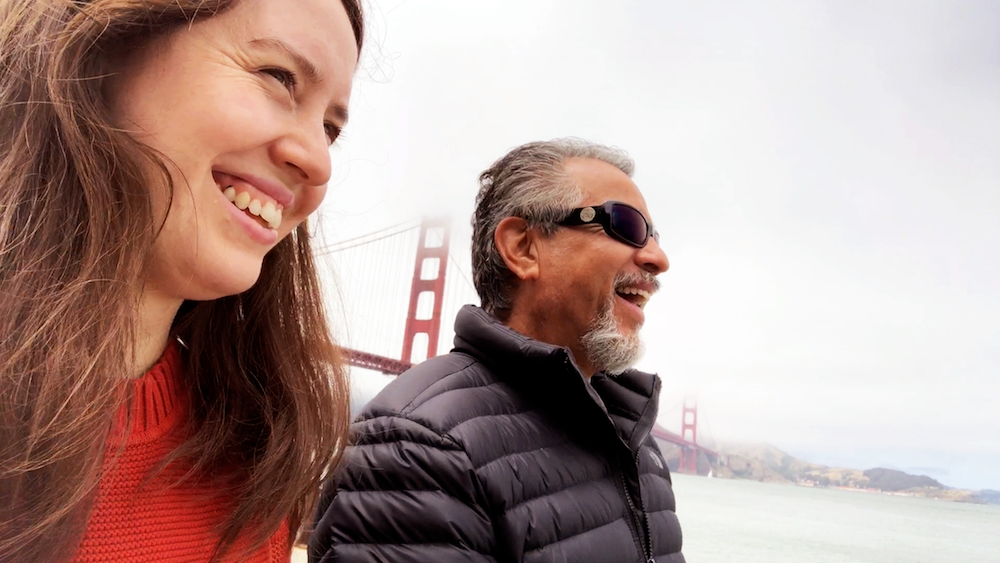
Reunited after 10 years during a pandemic
As part of PBS’ nationwide storytelling project, American Portrait, Ernesto Gonzalez reunites with his daughter Amelia after 10 years.
The new special that is supposed to air on Aug. 2, covers the stories of what it really means to be an American today, pandemic and all.
Amelia and Ernesto spoke to AL DÍA before the airing of their special about their experiences and reunion, which is part of their episode.
Since seeing each other again amid the pandemic and social distancing, much of the filming was done by both subjects as PBS producers guided them over the phone. They were sent a phone tripod to record their experiences.
Amelia went to visit her father in the Bay area for Father’s day weekend, where they shared moments they had not experienced in almost ten years, like walking together, going to eat at their favorite restaurants, and overall just enjoying each other's company.
Amelia began by telling AL DÍA that though she was able to visit her father, Ernesto, when he was at a maximum security prison in High Desert, Nevada, it was a challenge because her and her siblings lived in New York, and would need to pay for transportation and accommodations.
The prison would also only allow her sister and her six hours of visitation privileges over the span of two days, and only because they were coming to visit from out of state.
When Amelia was 15, her father was charged and she shared that it was a high profile case that covered throughout the media.
She added that when her friends from California found out, she felt shame and embarrassment, making her situation a difficult one. Her living situation also changed, and without the help of her dad's business, her mother had to work twice as hard to provide for her family.
“My relationship with my dad changed when I was about 16 or 17. I had gone down a difficult path, and almost got expelled from highschool for my behavior. At that time, I remember realizing I spent all this time trying to hurt someone, but really I just hurt myself,” said Amelia.
As she faced her own demons, she started practicing Buddhism, as her mom had been practicing since Amelia was a little girl, and used it to develop a sense of self, and find value in a relationship with her dad.
That was the turning point, where she started writing back letters to her father.
“The amount of respect for him is beyond,” Amelia said.
Her father’s case was first taken to a grand jury trial, and the duration was about eight months.
Amelia shared that she first received a text message about the case on February 24, 2020 from the handling attorney while she was on the train home from work.
“I remember seeing that text and being like: I’m going to pass out right here on the train. I’m gonna throw up,” said Amelia.
The verdict: Not guilty on all counts.
“I just broke down. My sister thought that he had gotten sentenced because that is how emotional I was,” she said.
Unfortunately, the novel coronavirus pandemic was already in the air, and started shutting things down quickly after he was released, therefore delaying their reunion.
Throughout the weekend, they went to coffee shops, walked around, ate, and did activities together that they had not gotten a chance to do in the last 10 years.
“We went to the Golden Gate Bridge and sat and talked. We had never really done anything like that because I was 15 the last time I saw him outside of prison,” she said.
When speaking with Ernesto, he noted that he had no idea what was going on in regards to the pandemic while he was in the prison. It was once he was acquitted and out that he was made aware of the virus.
RELATED CONTENT
Three weeks after he was released, he had symptoms, and went to get a test that turned out positive.
“Society had changed drastically. In 2011, people seemed friendlier,” said Ernesto.
He shared that it was tough for him to be around a lot of people and noise for a while. He said quarantine and social distancing actually helped him slowly and better reintegrate into society.
However, getting documentation was a challenge, and it took him five months to obtain a license.
Being separated from your family is never easy, and it wasn’t for Ernesto either.
For him, the family separation was the biggest problem.
“The worst thing was my daughters. Not the money, bikes, houses, cars — it was my kids,” said Ernesto.
“It was them that motivated me to not give up. To continue. They were instrumental with me not getting involved with the politics in prison. I come from a club, and I had choices I had to make about where I wanted to be in prison.”
Ernesto said what he realized in prison was that all you have is family.
“After the dust settled, I had no friends. I had five people who stuck around. That was my family,” he said.
Mending a relationship with his daughters while imprisoned was not an easy task. His oldest daughter first asked if he did not think about them when the incident that put him in prison first happened.
“I know that they went through struggles and I’m just now starting to hear about what they endured. I think though that they’re not telling me the extent of what they went through. But I’m glad that I can now be there for them,” said Ernesto.











LEAVE A COMMENT:
Join the discussion! Leave a comment.